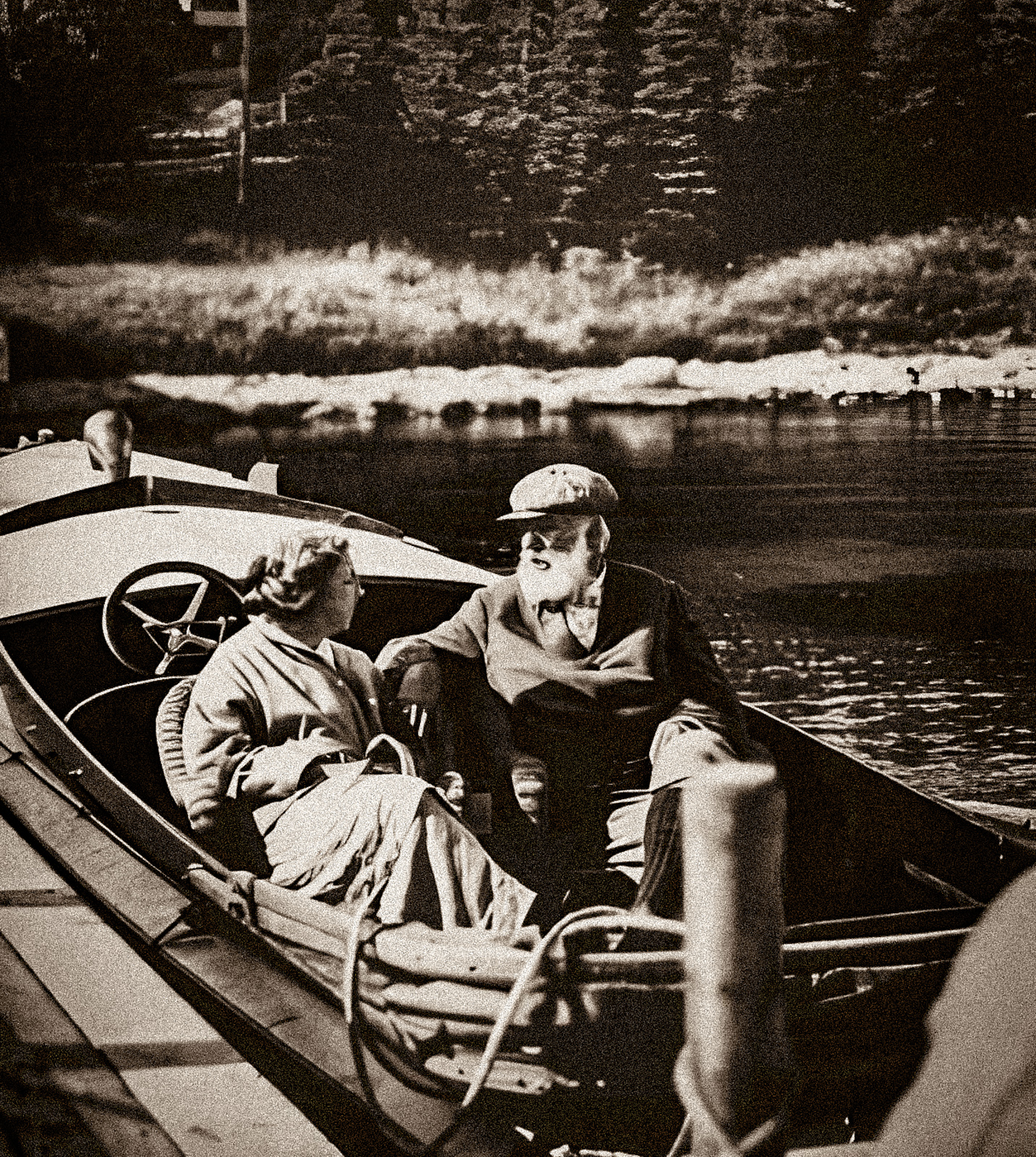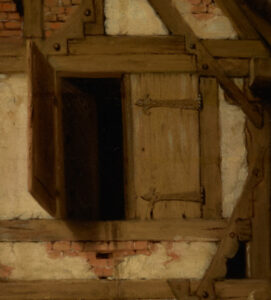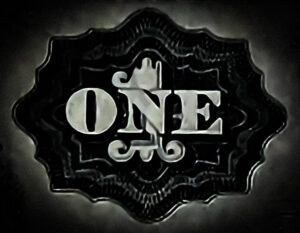—Ink and Echoes—

On Betterments
& Blunders
Alan Sullivan
—1915—

Premium Subscribers
Sorry, this feature is only available for H&F Print Premium subscribers. You can sign up here.
(If you are already a Print Premium subscriber, be sure to click the authentication link you were sent by email so this won't happen again.)
To the student of our times, man, more especially the North American man, has obviously been remodeled in the last fifty years. He is still kindred with his grandfather, but the kinship is becoming rapidly more remote. His temperament — and by temperament I mean that by which he expresses and communicates his point of view — has radically altered. We speak now of an old-fashioned person, meaning that he is what we were fifty years ago.
So, too, with our attributes. To be patient means now to lag behind our double-jointed life. To be particular is to be finicky or fussy. To be deliberate is to be slow. To live within a moderate income is to be close. To be devout is to be — well, a little peculiar and removed. We dare not be sentimental, and we are afraid not to seem practical. We are, most of us, pragmatists.
And with our changing minds, other things have naturally changed. Of these the most important is our view of religion. We have not, we think, much time to be what we call religious. The man who reads at his breakfast-table the news of yesterday of the whole world does not so easily contemplate the history of Nazareth. The fact that cotton and wheat are down, while steel common is up three points, and that these fluctuations will have a direct influence on the business of the day, is apt to mean more to him than any contemplation of his own divine origin. He may possibly go to church, but he goes with palpable regret for an abandoned cigar, and, duty done, he returns metaphorically licking his lips at the job ahead for the rest of the week. Broadly speaking, he cares nothing for what happened last week or last year or ten centuries ago. The big question is, what is going to happen tomorrow. If one could tell him that!
Literature has bent to the same standards. Gone are the Victorians who divided, subdivided, analyzed, and defined the emotions, and laid them, neatly parceled, on nearby and convenient shelves. Gone is the three-decker novel with its domestic and sartorial minutiae. Gone are odes, eulogies, and anagrams. The essay, that most delightful variant, is now depressingly elusive. The novel with a purpose is a scarecrow to most publishers. The short story has been perfected till it suits. It is crisp, polished, and asks for only half an hour. The ghost of Jesse James survives in the dime novel, but he is outraged by such modernities as Maxim silencers and pocket flashlights. The popular play races to its end at top pace; the curtain comes down in a rush, and, before you know where you are, the actors are in front of it, waiting for your applause. They, too, want to get away. The literature of today is, in short, ruthless and impatient. It insistently demands the core of the thing and demands it at once. What conclusions it comes to are suggestive, and invite you to work the thing out for yourself. Poetry is condensed, with here and there an epic in a line. The character of a nation is crammed into a phrase, the war of the world into an octet. As with literature, the tone is suggestive. The author has neither time nor disposition to do all your thinking for you. One is prone to wonder whether couplets and fugitive verse will live like “Childe Harold” and the “Ode on the Intimations of Immortality.”
The method and period of courtship has been abbreviated. It is no longer an epoch, but merely a phase. Our grandfathers went about it seriously, thoughtfully, taking pauses, time, pride, and pleasure. The modern youth mobilizes the telephone, telegraph, motor-car, and florist, and in a month gets as far in his lady’s affections as his father’s father got in a year. Theater, supper, and dance all buttress his energy. The foxtrot and maxixe bring him nearer his object than could ever the minuet and Sir Roger. The young man of small means no longer waits till a competence is assured, but gaily hooks his arm into the girl’s, and together they go forth to face the world. A vibrant pulse is singing in his veins. The wedding journey is shortened to a week or two. Time enough to get acquainted. Nothing is impossible if he is only quick enough.
The very artists have changed their mode. Where can one now find the meticulous depiction lavished with minute care in former days? Composition and style are merged in a definition of values that results in a broad treatment, completely eliminating everything that does not contribute to the insistent message of a painting. The dominant note rings swift and clear, accelerated by what has been discarded. The modern picture is completed in a fraction of the time occupied in producing its predecessor. It, too, is suggestive. All the work is not done by the artist.
Manners have been mutilated by the telephone to such an extent that many business houses have put a premium on civil speech. Everyday language loses its grace in rapid transit. The fare-box, thrust without a word in one’s face, is symbolical of the attitude of a people that has been overworked. The unforgettable contrivance with which the conductor on a Fifth Avenue ‘bus not only takes, but snatches, a coin from one’s hand, typifies better than anything else the elemental character of the modern businessman. It gets the money and is quick about it. We are abrupt to the point of insult, as though brevity were golden and verbal contractions a personal asset. All because under our present system it pays to be brief.
This is the result of fifty years — a moment in the life of a nation. It is also the cost of invention. It seems, therefore, that Alexander Graham Bell is unwittingly responsible through his telephone for our lack of manners; Frank Sprague, through his rapid transit, for our impatience; Morse, through his telegraph, for our brevity; and Edison, through his phonograph, for our restlessness.
Invention per se is intensely impersonal. It is a furor, a driving force exerted by some unrecognized brain cell. This frenzy, this possession, transmutes the inventor into a strange mechanism, which divorces itself from the life of men. It digs, it climbs, it tears open. Thus invention is a sudden finding or uncovering, and is not, strictly speaking, a building up or putting together. The idea is the thing, and the idea comes like a lightning flash. It is by nature and essence removed from subsequent experiment — the conception is almost superhuman. And, curiously enough, the same furor seizes upon the consumer. The theory being practically demonstrated, instantly the demand arises. The psychology of it is that the mind of the people marches side by side with the mind of its scientific prophets, and there is thus induced a general assumption of technical knowledge. The public has its own explanations of each new mechanical marvel, an assured familiarity that prompts an instant use.
It is then reasonable to assume that our period is but a link in a chain — of which one end is still in clear view and the other is on the knees of the gods. The deepest minds hold that a prodigious advance is still to be made, that we are only on the threshold of electrical development. In a recent letter to the writer, Dr. Bell, the inventor of the telephone, the electrical physicist, the interpreter of the dumb, states: “I may say that we are only at the beginning of the application of electrical energy, and an application of it will soon appear that has hitherto been undreamed of by the world.”
The city of the future is already something more than a scientific mirage. Let us imagine ourselves beholding it one hundred years hence. A glance reveals its streets, broad and spotless, to which the horse is a stranger, and whose smooth surface is unscarred by the universal pneumatic tire. Synthetic rubber has arrived. The city traffic is entirely electrical. Trucks and motors speed swiftly without odor or noise; they are charged with power at the great central station in off-peak hours . . . .
It is notable, too, that buildings are no longer overdecorated. Line, proportion, and form are the dominating factors. These structures arc full of light and air, and heated electrically. It is now many years since a new heating element was discovered, many times more efficient than its predecessor.
But the greatest changes have taken place in domestic life. Menial, manual work has disappeared, and there is no longer any difficulty in securing trained and skillful service. Food is kept in motor-cooled refrigerators, or brine is pumped through your larder from a central plant. Cooking is done on electric stoves. The meals of some fastidious families are sent scorching hot from a distributing restaurant. The slavery of dishwashing has vanished. This drudgery is performed by automatic cleansers and driers without wetting the hands. Vacuum cleaners remove the dust, ozonizers revivify the air, windows are mechanically scrubbed and polished. In short, the enfranchised domestic uses her fingers and brain instead of her arms and back. . . .
On the shining street men may be observed telephoning by wireless through minute portable instruments. This is an old story, achieved by a method of tuning to aerial waves of a given pitch. On the housetops, small antennae provide for long-distance work. . . . Electric trains have annihilated distance. Balanced by gyroscopes, they speed at two hundred miles an hour on a single rail, while overhead the sky is dotted with air-ships. . . .
The modern farmer smiles at the tales of his forerunners. Now one uses tons of fertilizing nitrogen, electrically extracted from the air, and, to be really up-to-date, one’s farm is crisscrossed eight feet above the ground with wires carrying high-tension current to stimulate growth. Plowing and cultivating are naturally done by power. One snaps a switch, and water circulates through perforated irrigating pipes underground. The whole thing is too simple. And if there arises any new need of transportation, or appliance, or machinery, a flock of inventors settles on the problem, secure in the reward of discovery. It was said that formerly the individual inventor was helpless against great corporations. One document in the city archives bears directly on the subject. It was written by Ward Leonard, who attacked the problem of electric locomotives and longdistance transmission and devised the system of control by which the turrets of American dreadnaughts were governed. This document says:
“In the United States today, a meritorious patent is, as a rule, merely an invitation to the powerful corporations to appropriate the patent invention. The inventor of ordinary means is unable to successfully fight such infringement.” . . .
The heart of the whole system, the nerve center that animates and controls, is the vast central station. There survive old prints of former stations, which used coal in a horribly wasteful method to produce electrical energy. This coal was actually burned under boilers, and but eight percent of its value realized. In those days a station of a quarter-million horsepower was considered immense. The modern installation is supplied with energy produced by gas-driven turbines. . . . It actuates railways and subways in its own area. It cooks, heats, lights, drives factories, waterworks, and motor cars; it cleans houses and streets. It flashes death to the electric chair, and extracts oxygen from the atmosphere to save life. It is so articulated that it vibrates to the life of the city, save that while the city sleeps the station energizes long freight trains that speed rapidly till dawn. . . .
And the people themselves are not materially changed save that there is a droop in the shoulder and they are less athletic. Legs and arms are feebler, since there is now practically no manual work. Heads are larger, and there is a new and striking pallor. Life is more colorless, scientific, and mental. The laughter of children is more rare. Emotion is popularly regarded as crude and prehistoric, and the thyroid gland is the arbiter of existence. . . . The mechanic glides to his automatic machinery in a small motor. He has much that the rich man has. To such an extent is life mechanical and without individual effort that the race is silent, critical, calculating, and without passion. The elements are trained and put to work, but in man there is left little that is elemental. Earth pays tribute, and man has climbed to the top of the ladder. But the greatest gulf of all remains unfathomed, and the stars are as far away as ever.
We have already to our credit most of the technical achievements of the city of the future. What has not been done is to coordinate these varied functions into a more perfect service. And when this has been accomplished and new functions have been added, there will come a moment potential in our history. The spirit of man will, for an instant of time, divest itself of outward things. It will look back on the old life with its blunders, its toil, its joys, revelations, and hopes, and forward to the alternative with its effortless satisfaction and smooth perfection, and put the stupendous question whose answer will govern him for all time — Is it worth while?





















